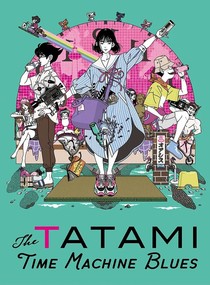Review
by Kim Morrissy,Tatami Time Machine Blues
| Synopsis: |  |
||
The protagonist's trouble-making friend Ozu gets the student apartments' only air conditioner remote control wet, breaking it on a certain midsummer day. The students wonder what to do about the situation for the remainder of the summer and make a plan with Akashi. An unstylish male student from 25 years in the future arrives in a time machine. The protagonist travels back in time to try to retrieve the remote control before it is broken. |
|||
| Review: | |||
It actually took a while for it to dawn on me that this was a bona fide sequel to The Tatami Galaxy. The thing about Tomihiko Morimi's novels is that they frequently share motifs, to the extent that it wouldn't have surprised me at all if Ozu, Watashi's mischievous friend, showed up in some other character's story just to be a pain in the neck. But as face after familiar face showed up in succession, I realized that this isn't just a spinoff channeling the energy of The Tatami Galaxy, it is a genuine continuation of Watashi's story. This is quite a nice thing, because for all the commonalities in The Eccentric Family and Night is Short, Walk On Girl, nothing has the unique charm of The Tatami Galaxy and its zany cast. Watashi's dry and exasperated commentary is back, as are the sci-fi phenomena that you're just meant to accept within this quirky vision of Kyoto. Instead of parallel universes, the central plot device is time travel, and it's used here in much the same way—to explore the protagonist's diminished feeling of agency. Shenanigans inevitably ensue. Regardless of whether you're already familiar with The Tatami Galaxy, the abridged length of this mini-series makes it an easy story to simply dive into. The plot gets going by the end of the first episode, and each subsequent episode is less than 20 minutes long. The twists and turns are fairly simple—this is one of those time travel plots where everyone scrambles to maintain a closed time loop—but the real point of the experience is relating to an anxious university student. Humorously and evocatively, it captures the feeling of having all the time in the world, but also no time at all. Watashi can't muster the courage to ask Akashi on a date. That's what the conflict in this mini-series boils down to. Tatami Time Machine Blues is a straightforward comedy; it doesn't have the big-brained philosophizing of The Tatami Galaxy. As a result, it doesn't punch as hard as the original, even if it does give Watashi and Akashi's relationship more closure. Such is the price of a sequel that merely seeks to be fun rather than cathartic. You don't need to have watched The Tatami Galaxy in order to appreciate this new series, but returning fans hoping for the story to dig deeper into the characters and their psyche may be somewhat disappointed. It's also worth noting that the main plot wraps up at the end of the fifth episode, and the sixth episode is an original prequel story. In that regard, Tatami Time Machine Blues ends on a rather muted note. If there's one area where the new series totally lives up to the original, it's the visuals. Shingo Natsume was perhaps the only director who could have captured the spirit of Masaaki Yuasa's original work without coming across as parodic. As an episode director on The Tatami Galaxy and a brilliantly inventive series director in his own right, Natsume was perfectly positioned to emphasize the show's visual charm. The art doesn't get as abstract as The Tatami Galaxy did at times, but each scene is perfectly paced; every moment of exaggeration and flourish feels contained and purposeful, designed to propel the action forward. As far as Science SARU productions go, this one threads the needle of accessible and off-beat better than most. Tatami Time Machine Blues is one of those rare, blessed sequels that never overstays its welcome. It actually leaves a very good aftertaste, because the plot doesn't take on more than it can chew and every thread gets wrapped up satisfactorily. Also, the series doesn't go on long enough to invite unflattering comparisons to the original; more than anything, it's simply a fun time in its own right. Don't let it slip under your radar because it's a sequel to an older work or because of its staggered worldwide distribution on Disney+. Disclosure: Kadokawa World Entertainment (KWE), a wholly owned subsidiary of Kadokawa Corporation, is the majority owner of Anime News Network, LLC. One or more of the companies mentioned in this article are part of the Kadokawa Group of Companies. |
| Grade: | |||
|
Overall : B+
Story : B+
Animation : A
Art : A
Music : B
+ As charming and witty as the original, well-paced time travel plot that doesn't take on more than it can chew |
|||
|
discuss this in the forum (4 posts) |
this article has been modified since it was originally posted; see change history |
|||
| Production Info: | ||
|
Full encyclopedia details about |
||